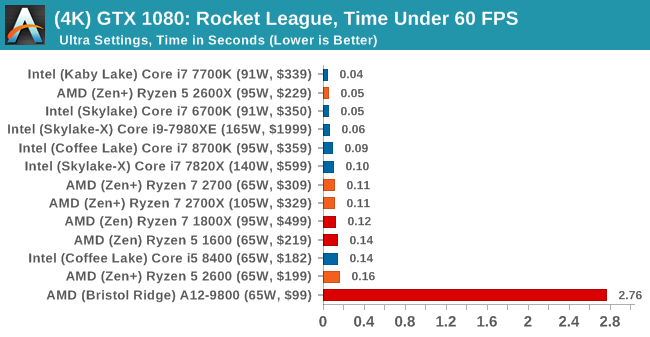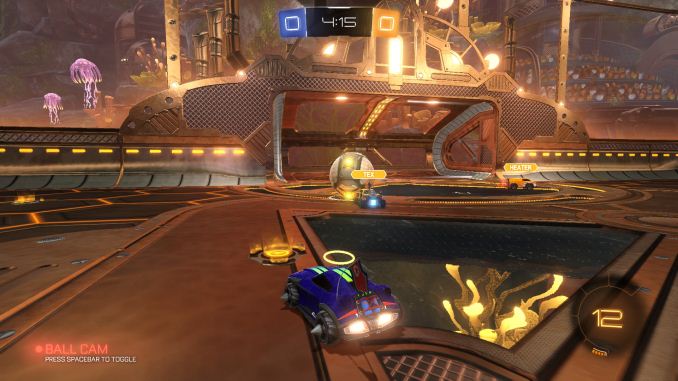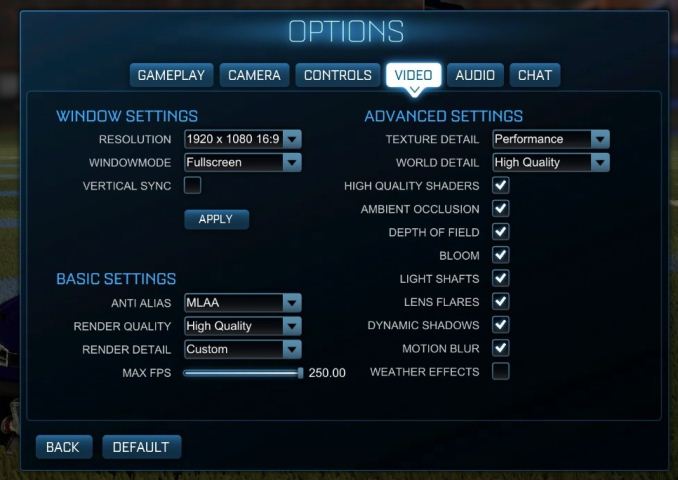The AMD 2nd Gen Ryzen Deep Dive: The 2700X, 2700, 2600X, and 2600 Tested
by Ian Cutress on April 19, 2018 9:00 AM ESTRocket League
Hilariously simple pick-up-and-play games are great fun. I'm a massive fan of the Katamari franchise for that reason — passing start on a controller and rolling around, picking up things to get bigger, is extremely simple. Until we get a PC version of Katamari that I can benchmark, we'll focus on Rocket League.
Rocket League combines the elements of pick-up-and-play, allowing users to jump into a game with other people (or bots) to play football with cars with zero rules. The title is built on Unreal Engine 3, which is somewhat old at this point, but it allows users to run the game on super-low-end systems while still taxing the big ones. Since the release in 2015, it has sold over 5 million copies and seems to be a fixture at LANs and game shows. Users who train get very serious, playing in teams and leagues with very few settings to configure, and everyone is on the same level. Rocket League is quickly becoming one of the favored titles for e-sports tournaments, especially when e-sports contests can be viewed directly from the game interface.
Based on these factors, plus the fact that it is an extremely fun title to load and play, we set out to find the best way to benchmark it. Unfortunately for the most part automatic benchmark modes for games are few and far between. Partly because of this, but also on the basis that it is built on the Unreal 3 engine, Rocket League does not have a benchmark mode. In this case, we have to develop a consistent run and record the frame rate.
Read our initial analysis on our Rocket League benchmark on low-end graphics here.
With Rocket League, there is no benchmark mode, so we have to perform a series of automated actions, similar to a racing game having a fixed number of laps. We take the following approach: Using Fraps to record the time taken to show each frame (and the overall frame rates), we use an automation tool to set up a consistent no-bot match on easy, with the system applying a series of inputs throughout the run, such as switching camera angles and driving around.
It turns out that this method is nicely indicative of a real match, driving up walls, boosting and even putting in the odd assist, save and/or goal, as weird as that sounds for an automated set of commands. To maintain consistency, the commands we apply are not random but time-fixed, and we also keep the map the same (Aquadome, known to be a tough map for GPUs due to water/transparency) and the car customization constant. We start recording just after a match starts, and record for 4 minutes of game time (think 5 laps of a DIRT: Rally benchmark), with average frame rates, 99th percentile and frame times all provided.
The graphics settings for Rocket League come in four broad, generic settings: Low, Medium, High and High FXAA. There are advanced settings in place for shadows and details; however, for these tests, we keep to the generic settings. For both 1920x1080 and 4K resolutions, we test at the High preset with an unlimited frame cap.
All of our benchmark results can also be found in our benchmark engine, Bench.
MSI GTX 1080 Gaming 8G Performance
1080p



4K
















545 Comments
View All Comments
mapesdhs - Monday, May 14, 2018 - link
You know what will happen there though, yet more accusations of conspiracy, etc.lfred - Wednesday, April 25, 2018 - link
Could anyone confirm the Wraith Prism cooler height 9.4cm , (and therefore wont fit a Silverstone Raven Z Mini-ITX case ) . thank youpsychok9 - Wednesday, April 25, 2018 - link
Hello Ian, is there any news this week?ET - Wednesday, April 25, 2018 - link
I'm still waiting for the StoreMI page.Sx57 - Wednesday, April 25, 2018 - link
Well i am still waiting for anandtech updating the article.i am very interested to know how ryzen beat coffelake so well.i believe anandtech review is perfomed rightly but i wanna know what is actually wrong with other reviews that make intel winner in some games.it seems not to be the security patches related.FaultierSid - Wednesday, April 25, 2018 - link
Did they just silently switch out all gaming benchmarks? Intel 8700K now winning across the board.rocky12345 - Wednesday, April 25, 2018 - link
Yep they sure did they must have redone the tsts but this time turned on MCE for Intel and upped the memory clock to at least 3200MHz for Intel as well to see those kinds of gains in games from the old charts from last week. If they decide to explain it they will spin it that oh they had the wrong data points in the charts for Intel...lolTEAMSWITCHER - Wednesday, April 25, 2018 - link
Yes .. at 1080P. The 4K gaming results are rather mixed. So the original conclusion still stands for me. The AMD Ryzen 2700X is roughly on par with the 8700K at 4K gaming, and pulls ahead in productivity applications.RafaelHerschel - Wednesday, April 25, 2018 - link
Here is how I see it, at 1080p the new Ryzen results are good enough for 60 FPS gaming. The 2600 (non-x model) sometimes drops below 60 FPS but for a system that is equally used for productivity and gaming, I can certainly live with that. For a system that is mainly used for gaming, I still prefer Intel, but by a slimmer margin than before.mapesdhs - Monday, May 14, 2018 - link
You are hereby awarded the Sensible Chap medal for mentioning 60Hz gaming in at least a non-negtive manner. 8) A few pages back, one guy described anything below 144Hz as useless.